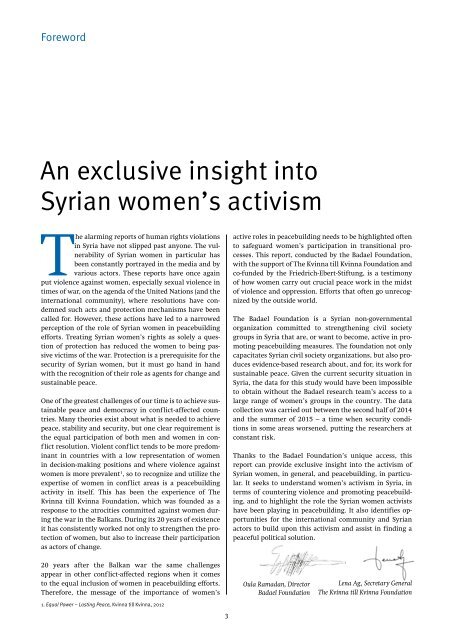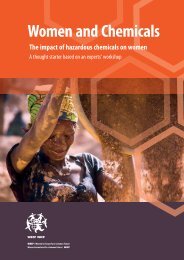future now”
YAO19
YAO19
Create successful ePaper yourself
Turn your PDF publications into a flip-book with our unique Google optimized e-Paper software.
Foreword<br />
An exclusive insight into<br />
Syrian women’s activism<br />
The alarming reports of human rights violations<br />
in Syria have not slipped past anyone. The vulnerability<br />
of Syrian women in particular has<br />
been constantly portrayed in the media and by<br />
various actors. These reports have once again<br />
put violence against women, especially sexual violence in<br />
times of war, on the agenda of the United Nations (and the<br />
international community), where resolutions have condemned<br />
such acts and protection mechanisms have been<br />
called for. However, these actions have led to a narrowed<br />
perception of the role of Syrian women in peacebuilding<br />
efforts. Treating Syrian women’s rights as solely a question<br />
of protection has reduced the women to being passive<br />
victims of the war. Protection is a prerequisite for the<br />
security of Syrian women, but it must go hand in hand<br />
with the recognition of their role as agents for change and<br />
sustainable peace.<br />
One of the greatest challenges of our time is to achieve sustainable<br />
peace and democracy in conflict-affected countries.<br />
Many theories exist about what is needed to achieve<br />
peace, stability and security, but one clear requirement is<br />
the equal participation of both men and women in conflict<br />
resolution. Violent conflict tends to be more predominant<br />
in countries with a low representation of women<br />
in decision-making positions and where violence against<br />
women is more prevalent 1 , so to recognize and utilize the<br />
expertise of women in conflict areas is a peacebuilding<br />
activity in itself. This has been the experience of The<br />
Kvinna till Kvinna Foundation, which was founded as a<br />
response to the atrocities committed against women during<br />
the war in the Balkans. During its 20 years of existence<br />
it has consistently worked not only to strengthen the protection<br />
of women, but also to increase their participation<br />
as actors of change.<br />
active roles in peacebuilding needs to be highlighted often<br />
to safeguard women’s participation in transitional processes.<br />
This report, conducted by the Badael Foundation,<br />
with the support of The Kvinna till Kvinna Foundation and<br />
co-funded by the Friedrich-Ebert-Stiftung, is a testimony<br />
of how women carry out crucial peace work in the midst<br />
of violence and oppression. Efforts that often go unrecognized<br />
by the outside world.<br />
The Badael Foundation is a Syrian non-governmental<br />
organization committed to strengthening civil society<br />
groups in Syria that are, or want to become, active in promoting<br />
peacebuilding measures. The foundation not only<br />
capacitates Syrian civil society organizations, but also produces<br />
evidence-based research about, and for, its work for<br />
sustainable peace. Given the current security situation in<br />
Syria, the data for this study would have been impossible<br />
to obtain without the Badael research team’s access to a<br />
large range of women’s groups in the country. The data<br />
collection was carried out between the second half of 2014<br />
and the summer of 2015 – a time when security conditions<br />
in some areas worsened, putting the researchers at<br />
constant risk.<br />
Thanks to the Badael Foundation’s unique access, this<br />
report can provide exclusive insight into the activism of<br />
Syrian women, in general, and peacebuilding, in particular.<br />
It seeks to understand women’s activism in Syria, in<br />
terms of countering violence and promoting peacebuilding,<br />
and to highlight the role the Syrian women activists<br />
have been playing in peacebuilding. It also identifies opportunities<br />
for the international community and Syrian<br />
actors to build upon this activism and assist in finding a<br />
peaceful political solution.<br />
20 years after the Balkan war the same challenges<br />
appear in other conflict-affected regions when it comes<br />
to the equal inclusion of women in peacebuilding efforts.<br />
Therefore, the message of the importance of women’s<br />
Oula Ramadan, Director<br />
Badael Foundation<br />
Lena Ag, Secretary General<br />
The Kvinna till Kvinna Foundation<br />
1. Equal Power – Lasting Peace, Kvinna till Kvinna, 2012<br />
3



